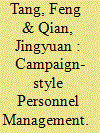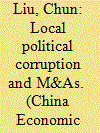| Srl | Item |
| 1 |
ID:
192091


|
|
|
|
|
| Summary/Abstract |
Under China’s one-party system, luxury consumption is an act that might have political consequences. The authors propose a game-theoretical model and conduct an empirical study to explain why the Chinese luxury market actually expanded rapidly at the height of Xi’s anti-corruption and anti-extravagance campaign. The findings show that this outcome was an unintended consequence of changing patterns of perceived political risk in the context of the anti-corruption campaign. During the Hu-Wen period, a tougher local crackdown was a leading signal of a power struggle and was associated with growing distrust in politics, and therefore reduced luxury consumption. After Xi launched his anti-corruption campaign, a tougher local crackdown on corruption became a lagging signal of risk clearance and hence no longer suppressed luxury consumption.
|
|
|
|
|
|
|
|
|
|
|
|
|
|
|
|
| 2 |
ID:
193213


|
|
|
|
|
| Summary/Abstract |
The anti-corruption campaign launched by General Secretary Xi Jinping has been one of the most far-reaching bureaucratic overhauls in modern Chinese history. How has Xi's crackdown on corruption shaped bureaucratic selection at the sub-provincial level? In this paper, we find that the purge has influenced how local ties are weighed in the appointment of prefecture city leaders. While it is common for provincial Party chiefs to appoint locally embedded officials to govern localities without high-profile corruption cases, they tend to appoint outside officials without local experience and connections to manage cities whose ex-leaders have recently been prosecuted for corruption. We argue that the provincial leaders’ objective of installing non-local officials is to exert hierarchical control and oversight in localities affected by corruption. Using an original dataset of all Party secretaries from China's 287 prefecture-level cities between 2013 and 2020, we find a significant divergence in the local embeddedness of officials who are appointed to replace corrupt ex-leaders and the embeddedness of those who fill the vacancies of transferred or retired predecessors. Our study sheds light on how Xi's anti-corruption campaign has reshaped the central–local relations and the logic of political control in China.
|
|
|
|
|
|
|
|
|
|
|
|
|
|
|
|
| 3 |
ID:
182785


|
|
|
|
|
| Summary/Abstract |
We examine the relation between local political corruption and firms' cross-province M&As using provincial-level data on corruption in China. The results show that firms in more corrupt regions are less likely to engage in cross-province M&As. Further analyses reveal that the effects of local corruption on the probability of cross-province M&As are stronger when corrupt officers have greater impeding benefits or lower impeding costs. Meanwhile, Both ex-ante intervention and ex-post punishment are important channels through which corrupt officers hinder firms' cross-province M&As. Moreover, informal institutions, such as social capital and informal networks can help to alleviate the negative impact of political corruption on firms' cross-province M&As.Our findings show that in the context of highly government intervention, cross-province M&As not only cannot be an effective channel to shield from expropriation, but are themselves highly distorted and lead to significant economic efficiency losses.
|
|
|
|
|
|
|
|
|
|
|
|
|
|
|
|
| 4 |
ID:
148213


|
|
|
|
|
| Summary/Abstract |
Since emerging as China’s top leader following the 18th Party Congress, Xi Jinping has moved swiftly to consolidate his formal authority as Central Military Commission chairman over the Chinese People’s Liberation Army. In redressing the civil-military imbalance wrought by Dengist economic reforms, the commander-in-chief has combined institutional mechanisms with the use of fear to impose authoritative civilian control over the military. This paper proposes that a combination of changes to the Chinese strategic environment has contributed to Xi’s utility of the anti-corruption campaign to purge the regime’s coercive forces of its previous underpinnings, and advances that the war on military malfeasance has given rise to a new set of dynamics in civil-military relations in post-Reform China.
|
|
|
|
|
|
|
|
|
|
|
|
|
|
|
|
| 5 |
ID:
184761


|
|
|
|
|
| Summary/Abstract |
North Korea is widely seen as having among the most corrupt governments in the world. However, the Kim family regime has not always been so accepting of government wrongdoing. Drawing on archival evidence, this study shows that Kim Il-sung saw corruption as a threat to economic development and launched campaigns to curb it throughout the 1950s. I find that these campaigns were at least somewhat successful, and they contributed to post-Korean War reconstruction and rapid development afterwards. So when and why did the regime shift from combating corruption to embracing it? I argue that changes in the country's economic system following the crisis of the 1990s, especially de facto marketization, made corruption more beneficial to the regime both as a source of revenue and as an escape valve for public discontent. This study's findings contribute to our understanding of the politics of corruption control in authoritarian regimes.
|
|
|
|
|
|
|
|
|
|
|
|
|
|
|
|
| 6 |
ID:
179246


|
|
|
|
|
| Summary/Abstract |
While Vietnam suffered economically due to COVID-19, the ruling Vietnam Communist Party burnished its image through its successful management of the crisis. This review examines the roots of the party’s success and discusses why the party has nonetheless continued to stifle dissent. It also previews the 13th Party Congress.
|
|
|
|
|
|
|
|
|
|
|
|
|
|
|
|